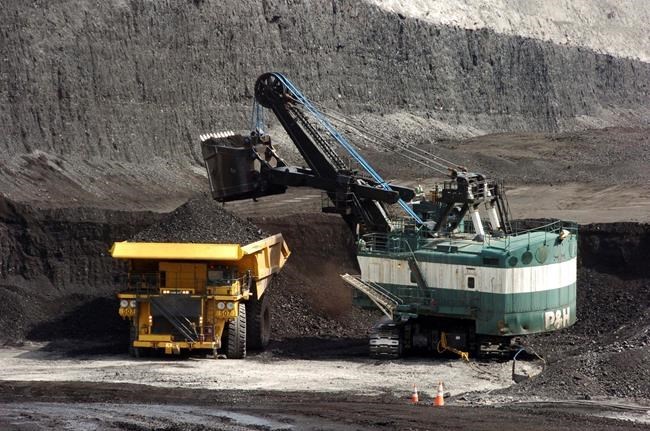
FILE - In this April 4, 2013, file photo, a mechanized shovel loads a haul truck with coal at the Spring Creek coal mine near Decker, Mont. A judge says U.S officials downplayed the climate change impacts and other environmental costs from the expansion of a massive coal mine near the Montana-Wyoming border, in a case that could show how far the Biden administration is willing to go to unwind his predecessors' decisions. (AP Photo/Matthew Brown, File)
February 04, 2021 - 2:23 PM
BILLINGS, Mont. - A judge says U.S officials downplayed climate change impacts and other environmental costs from the expansion of a massive coal mine near the Montana-Wyoming border, in a case that could test how far the Biden administration is willing to go to unwind its predecessors' decisions.
The lawsuit over Montana's Spring Creek mine hinges in part on an issue central to President Joe Biden's climate change agenda: Making decisions based on the full costs of fossil fuel extraction, including impacts on a warming planet that are being felt across society.
U.S. District Judge Susan Watters said that under former President Donald Trump, the Interior Department played up the economic benefits of the 2-square-mile (5-square-kilometre) expansion of Spring Creek, which opened up development of 85 million tons of coal.
But Watters said in her ruling Wednesday that officials failed to fully consider how burning the coal would contribute to climate change, known as the “social cost of carbon," a concept that places a dollar value on every ton of greenhouse gasses emitted.
Trump in 2017 issued an order for agencies not to use social cost of carbon estimates developed at the end of the Obama administration. Watters said the executive order did not excuse the government from considering those costs if they represent the best science.
“Federal agencies cannot ignore more accurate scientific information when it is available,” Watters wrote. A federal magistrate judge issued similar recommendations in 2019, but the case had been put on hold after former owner Cloud Peak Energy went bankrupt.
Spring Creek employs about 250 workers who mined more than 9 million tons of coal in 2020, according to government records. The strip mine — Montana’s largest, established in 1979 — was bought by the Navajo Nation-owned Navajo Transitional Energy Company in 2019.
Mining in the Spring Creek expansion has been ongoing since it was approved in 2012. Watters rejected a request from environmentalists to reverse that approval, which could have blocked mining. She gave the government until October to do a new analysis of the mine's climate impacts and other environmental effects.
Jeremy Nichols with WildEarth Guardians, one of the environmental groups that sued over the expansion, said the case highlighted the need for the Biden administration to reform its fossil fuel leasing programs.
“What this ruling really underscores is that the federal government’s management of coal is still a mess and highlights the need for Biden to make coal reform a priority," Nichols said.
On his first day in office, Biden ordered government agencies to account for damages caused by increased greenhouse gas emissions, including changes in farm productivity, human health and property damage from increased flood risk.
"An accurate social cost is essential for agencies to accurately determine the social benefits of reducing greenhouse gas emissions when conducting cost-benefit analyses," Biden wrote in his order.
A Navajo Transitional Energy Company representative said the ruling will not change operations at the mine. The company believes federal officials already met their obligations to review the project and will weigh its legal options, spokesperson Erny Zah said.
U.S. Office of Surface Mining communications chief Tristan Weis said the agency was not commenting on the case.
The publicly owned land that's in dispute was leased by Cloud Peak Energy in 2007. It’s located in a sparsely populated area of southeastern Montana dominated by ranching and mining.
Environmentalists sued when the mine expansion was approved, claiming climate change hadn’t been fully considered under the Obama administration. That led to a 2016 order for officials to re-examine the environmental impacts, and then another lawsuit when that study was completed.
____
Follow Matthew Brown on Twitter: @MatthewBrownAP
News from © The Associated Press, 2021